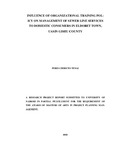| dc.description.abstract | The global competition and swiftness of changes in organizational training policy
emphasize the significance of human capital within institutions, as well as innovations
in knowledge development. In the economy where uncertainty is the only certainty,
knowledge is becoming a reliable source of sustained competitive advantage
with organizational training policy which can only be realized through sustained training
needs assessment. The product of identifying training needs is a description of exactly
what training is required and the identified needs are then transformed into measurable
objectives that a training designer or developer can use to select or create a
training course to meet the identified needs. As a result of expansive research, job satisfaction
has been linked to productivity, motivation, work satisfaction, growth satisfaction
and work effectiveness. This is brought about by well defined job descriptions
that stipulate the job requirements, tasks, extend of responsibility, tools of recruitment
and hence ethical issues that govern the job. This study sought to establish the Influence
of Organizational Training Policy on management of sewer line Services to domestic
consumers in Eldoret town. It was guided by the following objectives; to examine
the organizational training policy, to find out the impacts of training policy in
service delivery, to gauge the staff effectiveness on service delivery (use of service
charter), to find further/investigate ways of identifying training needs of the organization
and to access the challenges in the process of training. The study was guided by
four levels of Kirkpatrick's evaluation theory which is essential in training of employees.
The study employed a research design which is descriptive. The study targeted
employees at Eldowas. It involved 420 employees and whose response was sought.
The employee population came from different levels that included; top management
6, middle level 50 and 64 support staff. Sampling design of 20 % was determined before
any data were collected to get a sample of 84 respondents who participated in the
study. The study used questionnaires in collection of data. The researcher visited employees
of Eldoret Water and Sanitation Company to seek consent from the officers to
conduct research after explaining about the purpose of the study. Each respondent
who was sampled then approached and their consent sought, after which they were
requested to respond to the questionnaire and interviews as honestly as possible. Data
collected was analyzed using descriptive frequency tables and percentages. The study
discovered that training policy is very vital organizational tool in realizing institutional,
employee and customer needs for management of time, costs, satisfaction and
hence effective service delivery to all. | en |

